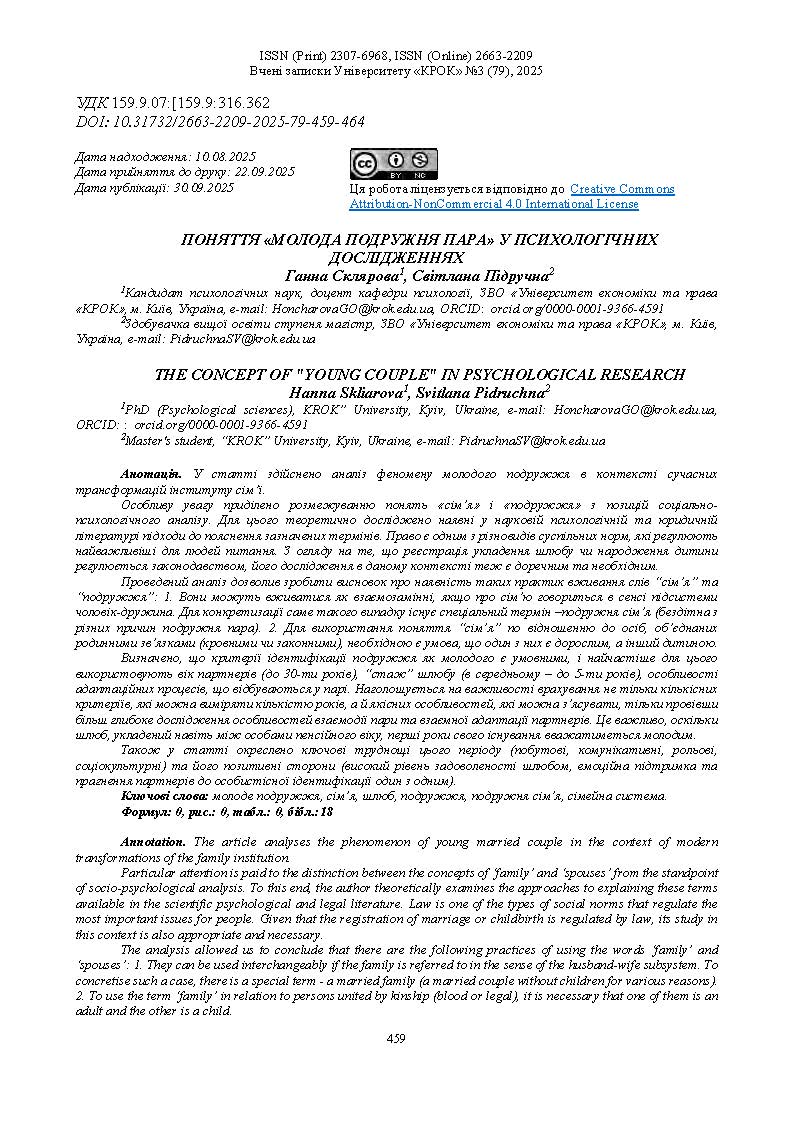THE CONCEPT OF "YOUNG COUPLE" IN PSYCHOLOGICAL RESEARCH
DOI:
https://doi.org/10.31732/2663-2209-2025-79-459-464Keywords:
young couple, family, marriage, married couple, spouses, married family, family systemAbstract
The article analyses the phenomenon of young married couple in the context of modern transformations of the family institution.
Particular attention is paid to the distinction between the concepts of ‘family’ and ‘spouses’ from the standpoint of socio-psychological analysis. To this end, the author theoretically examines the approaches to explaining these terms available in the scientific psychological and legal literature. Law is one of the types of social norms that regulate the most important issues for people. Given that the registration of marriage or childbirth is regulated by law, its study in this context is also appropriate and necessary.
The analysis allowed us to conclude that there are the following practices of using the words ‘family’ and ‘spouses’: 1. They can be used interchangeably if the family is referred to in the sense of the husband-wife subsystem. To concretise such a case, there is a special term - a married family (a married couple without children for various reasons). 2. To use the term ‘family’ in relation to persons united by kinship (blood or legal), it is necessary that one of them is an adult and the other is a child.
It is determined that the criteria for identifying a couple as young are conditional, and most often the age of the partners (up to 30 years), the ‘length of marriage’ (on average - up to 5 years), and the peculiarities of adaptation processes taking place in a couple are used for this purpose. The author emphasises the importance of taking into account not only quantitative criteria that can be measured by the number of years, but also qualitative features that can only be found out by conducting a deeper study of the peculiarities of couple interaction and mutual adaptation of partners. This is important because a marriage, even between people of retirement age, will be considered young in its first years.
The article also outlines the key difficulties of this period (domestic, communicative, role, socio-cultural) and its positive aspects (high level of marriage satisfaction, emotional support and partners' desire for personal identification with each other).
Downloads
References
Буковинський, А. Й. (2012). Сім'я як соціокультурний феномен в Україні (Кандидатська дисертація). Доступ через: https://enpuir.npu.edu.ua/bitstream/handle/123456789/41672/Bukovynskyi_dis.pdf?sequence=1.
Васильченко, О. М. (2016). Сучасні підходи до дослідження сім’ї у психології. Правничий вісник Університету «КРОК», 24, 221–228.
Волошок, О. В. (2019). Соціально-психологічні чинники задоволеності шлюбом осіб періоду ранньої дорослості. Науковий вісник Херсонського держ. ун-ту. Психологічні науки, 3, 122–128.
Говорун, Т. В., & Кікінежді, O. М. (2004). Гендерна психологія: навч. посіб. Київ: Академія.
Горецька, О. В., & Сердюк, Н. І. (2015). Психологія сім’ї: навч. посіб. Бердянськ: Видавець Ткачук О. В.
Котлова, Л. О., & Саух, І. Д. (2019). Психологічні чинники задоволеності шлюбом на різних етапах подружнього життя. Науковий вісник Херсонського держ. ун-ту. Психологічні науки, 1, 223–228.
Кравець, В. П. (1995). Психологія сімейного життя: навч. пос.част. II. Тернопіль.
Лукаш, Ю. С., & Сингаївська, І. В. (2020). Особливості структурно-функційних характеристик подружжя з дисфункційними взаєминами. Держава, регіони, підприємництво: інформаційні, суспільно-правові, соціально-економічні аспекти розвитку: тези доповідей ІІ Міжнародної конференції університету «КРОК», 181–183.
Менабдишвілі, Н. Є. (2014). Взаємовідносини подружжя та розподіл обов’язків у сучасній сім’ї. Демографічні та соціологічні проблеми: збірник праць Інституту демографії та соціології Державного університету Ілії, 139–146.
Поліщук, В. М.(Ed), Ільїна, Н. М., Поліщук, С. А., Савченко, Ю. Ю., Мисник, С. О., Рябко, Ю. В., & Шейкоза Г. Д. (2021). Психологія сім’ї: підручник. Суми: Університетська книга.
Ренке, С. О. (2010). Сім’я як соціально-психологічний феномен. Проблеми сучасної психології : зб. наук. пр. Кам’янець-Поділ. нац. ун-ту ім. І. Огієнка, Ін-ту психології ім. Г. С. Костюка АПН України, 9, 357–364.
Сімейний кодекс України від 10.01.2002 № 2947-III. Відомості Верховної Ради України, 2002, № 21-22, 135.
Федоренко, Р. П. (2007). Психологія молодої сім’ї та сімейна криза: монографія. Луцьк: РВВ «Вежа».
Цільмак, О. М.(Ed), & Лефтеров, В. О. (2020). Психологія сім’ї та шлюбу: таблиці, схеми, коментарі: навчально-наочний підручник. Київ: Ліра-К.
Чигир, О. М. (2012). Подружжя-шлюб-сімʼя: звʼязок та відмінність понять. Актуальні проблеми психології, 12. Психологія творчості, 14, 278–283.
Gottman, D., & Silver, N. (2015). The Seven Principles for Making Marriage Work. New York: Harmony.
Olson, D. H. (2000). Circumplex Model of Marital and Family Systems. Journal of Family Therapy, 22, 144–167.
Satir, V., & Banmen, J., & Gerber, J., & Gomori, M. (1991). The Satir Model. Family Therapy and Beyond. Palo Alto: Science and Behavior Books.

Downloads
Published
How to Cite
Issue
Section
License

This work is licensed under a Creative Commons Attribution-NonCommercial 4.0 International License.

